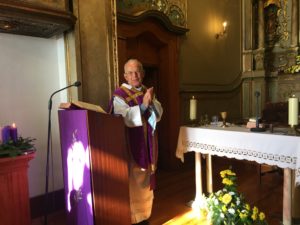Welcome Father Andrew
The last time I visited Father Michael who is the Chaplain of the Anglican Holy Trinity Church, in Funchal, I had the privilege of meeting Fr. Andrew who had arrived from Canada to visit the Anglican Community. I am not sure but I think that before I said “Hello! How are you” I immediately invited him to visit our Catholic Community at Penha de França and give the homily. He kindly said yes but it would have to take place on his next visit to Madeira. Well it happened that last Sunday I saw this man at Mass and he looked like Fr. Andrew. It was when I finished Mass and went to the sacristy that this man greeted me and said: “Yes! Next Sunday I will be here and ready to preach”.
Besides, two weeks ago, the Christian world celebrated the “Week of Prayer for Christian Unity”. And here we are with Fr. Andrew celebrating our Search for Unity and in this process rejoicing that in spite of our differences we all can live and pray together and also try to find other instruments to unite us in Body of Christ. I also asked him to write something about himself and send pictures.
And here is Fr. Andrew…. Welcome to your house.
Fr. Bernardino Andrade
07/02/2021
Dear friends,
In the spirit of our recent Week for Christian Unity, I am very glad and honoured to receive an invitation from Fr. Bernardino to preach this week at Sunday Eucharist.
My name is Fr. Andrew Twiddy, and I serve as a diocesan priest of the Anglican Church of Canada, also licensed for the Diocese in Europe, and assisting Fr. Michael at the English Church, Igreja Inglesa, here in Funchal. I have a Franciscan charism as a Companion to the Society of Saint Francis, and my long-term mentor and inspiration in ministry is RC priest and friar, Fr. Richard Rohr, OFM, of the Center for Action and Contemplation.
Perhaps you know of Europe’s rarest seabird, the Freira da Madeira, or “Madeiran Nun”. It nests around Pico Ruivo in the winter and spring, and flies to Canada for the summer. Except it is not really a nun, because it has a nest, a family, and brings chicks into the world! Well, I like to think of myself as a “Freire da Madeira”. I have visited Madeira six times since 2014, usually in winter, and then I live and work most of the year in my parish of Parksville, in Central Vancouver Island, Canada. Except that I am not really a friar either, since I am a husband, and have 5 children and 4 grandchildren! I travel here with my wife Sandy, and my canine liturgical assistant Keelie, who helps me with a Franciscan Eucharist I celebrate monthly at home.
One more thing to tell you, and one of the reasons I rejoice in the convergence of our liturgies and practice since Vatican II, that makes it easier for us all to collaborate and for me to be here this Sunday as a guest preacher. I am glad to call as my friend and colleague, Bishop Remi de Roo, now aged 96, and the last active Roman Catholic bishop to have participated in all 4 sessions of the 2nd Vatican Council (1962-66).
He lives a short distance from my home, and we collaborate and teach together on a project called Spirituality Beyond Borders, that helps me live out my Franciscan vocation in spirituality and teaching. Last summer we ran a retreat together with another friend, Pearl Gervais, and I played the role of Francis of Assisi, Pearl assumed the character of Hildegard of Bingen, and Remi was Thomas of Aquinas!
Thank you, Father Bernardino, and the good people of Penha de Franca, for your welcome!
Fr. Andrew Twiddy (atwiddy99@gmail.com)
FIRST INTERNATIONAL DAY OF HUMAN FRATERNITY – Feb. 4th, 2021
In December last year, the United Nations declared February 4th as International Day of Human Fraternity. This Thursday, February 4th, it was the First time it was celebrated. The idea started 2 years ago, with a document signed by Pope Francis and the Grand Imam of Al-Azhar, Sheikh Ahmad Al-Tayyeb, the Leader of the Islamic Community.
“Fraternity is the new frontier for humanity. It is the challenge of our century, the challenge of our times. There is no time for indifference. Either we are brothers and sisters or we will destroy each other…. A world without fraternity is a world of enemies.” That was the essence of what Pope Francis said as he joined the Grand Imam of Al-Azhar, Ahmad Al-Tayyeb, on Feb. 4, in an inspiring virtual conference to celebrate the first-ever International Day of Human Fraternity.
The head of the Catholic Church and the head of Al-Azhar gave the world yet another powerful witness of their friendship and commitment to work together for peace among the nations. Speaking at the event, from Rome and Cairo respectively, the religious leaders reaffirmed, as they had done in Abu Dhabi two years ago, the fundamental teaching of their respective religious traditions: that all human beings are created by the one God and are called to live together as brothers and sisters. The event was hosted in Abu Dhabi by Judge Mohamed Abdel-Salam and transmitted worldwide by Vatican Media.
Read more at:
www.americamagazine.org/faith/2021/02/04/pope-francis-grand-imam-international-day-human-fraternity-239926
More information can also be found on the website: www.humanfraternityday.org


